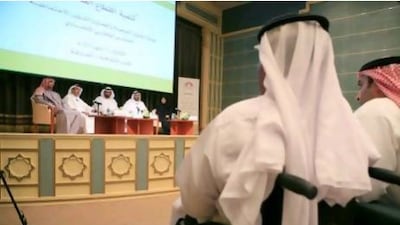SHARJAH // Health authorities from across the UAE gathered in Sharjah yesterday to voice their concerns to the FNC about the lack of a regulator in the health sector.
The absence of a unified medical board to oversee the Health Authority - Abu Dhabi (Haad), Dubai Health Authority (DHA) and the Ministry of Health creates major problems, doctors said at the open seminar.
They said those problems included shortage of medications and doctors and allowed unlicenced practitioners who were blacklisted in their own country to work in the UAE.
Dr Ali Al Ali, the health executive manager at Haad, said the need to regulate medical licences was the reason Haad was formed.
"Unfortunately, we found some doctors used to work on forged certificates and worked on fake work experience," Dr Al Ali said.
And while regulations require medical licences for all doctors and staff in Abu Dhabi emirate to be recorded in Haad's database, he said some of the old healthcare centres, particularly in residential areas, were still operating without meeting standards.
"We cannot close all of them. We gave them opportunity to fix their problems," Dr Al Ali said. "But new institutions need to stick to the new standards."
He said there was a possibility that licences would be unified throughout the GCC, saving months of waiting while new licences are issued when moving jobs in the Gulf.
Doctors in the audience were pleased with the news.
Dr Taiba, from Fujairah, said the ministry relied on completely different conditions when issuing medical licences.
She also stressed the need to be consistent when applying conditions to Emirati doctors. "Out of experience, we have found they need more training," Dr Taiba said.
But Dr Al Ali said they all needed to meet the same conditions to work and that they were only exempted from work experience.
"This is their country and we cannot send them out for experience - but they must pass the authority's examinations," he said.
Dr Khalid Khalfan, a paediatrician at Al Qassimi Hospital, stressed a need to unify licences as soon as possible.
"A lot of people are blacklisted in their country and work here," Dr Khalfan said. "I saw one in Saudi Arabia who was. I have seen these cases myself."
Dr Mariam Kaldari, a retired doctor who worked with the ministry for 20 years in the medications department, said a shortage of medicines was another prevailing problem.
Dr Kaldari said there was a need to monitor hospitals and clinics affiliated to the ministry to ensure medications were moved, and not just left to collect dust on the shelf.
She said medical files for patients should be on one register to prevent anyone from obtaining medications from more than one place, with the same prescription.
Dr Kaldari called for an independent third party to be established to regulate the sector and monitor medications.
"We need an Emirates FDA [Food and Drug Administration]," she said. "Saudi Arabia has this."
Dr Kaldari said one solution would be for more support to be given to local drug makers, as only 5 per cent of medication at the ministry is made locally.
There was often a shortage of medication for diabetes, high blood pressure and heart diseases, she said.
Dr Humaid Al Shamsi, also a retired employee of the Ministry of Health, blamed the shortage on the ministry.
"Shortage in medication is due to the failure of the department," Dr Al Shamsi said.
"We do not hear of this at Haad or DHA, just the ministry."
And with an absence of a medical board, Emirati medical graduates stand little chance of competing with doctors who are educated and trained abroad, the seminar heard.
Dr Mohamed Baniyas, dean of the medical college at UAE University, concluded the session by saying medical graduates suffered in the country because of an absence of a medical board to regulate speciality tracks.
"While 20 per cent continue their training abroad, 80 per cent stay here," Dr Baniyas said.
He said that while the Arabic board was an option, it was not sufficiently certified.
"Emiratis do not want to go to the Arabic board because they are taken below what they trained for, and then need several years of more training to be a consultant," Dr Baniyas said.
Because of this, most Emirati doctors left to train in the country end up as general practitioners, he said.

